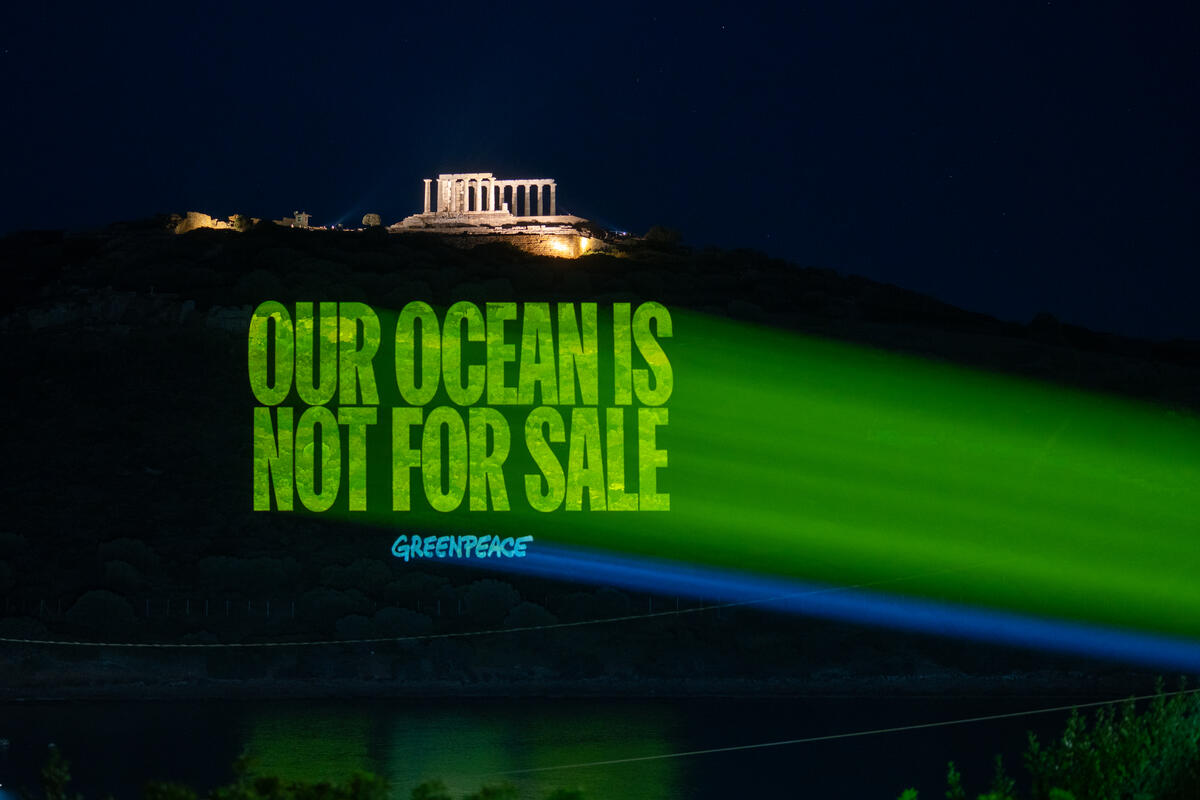An Open Letter to the Ministry of Energy Transition and Water Transformation and the Government of Sabah Regarding Oil and Gas Exploration in an IUCN Marine Protected Area4 October 2024.
Oil and gas exploration in the Tun Mustapha Marine Park (TMP) is imminent, following the signing of a production sharing contract (PSC) for block SB-403[1][15], which is located entirely within the TMP’s boundaries [2]. We, a group of civil society organisations committed to environmental sustainability, biodiversity conservation and human rights and justice, wish to express our objection to proposed oil and gas projects in this marine protected area in Sabah.
The TMP is a key biodiversity site:
The 898,700 hectares Park was gazetted in 2016 and is the largest marine protected area in Malaysia, being an International Union for Conservation of Nature (IUCN) Category VI Park (protected area allowing sustainable use of natural resources). The park is located in the Sulu Sulawesi Marine Ecoregion and is a priority seascape of the Coral Triangle, which is one of the world’s key marine biodiversity hotspots. The Park is home to seagrass beds that spread out over 50 islands, 17,000 hectares of mangroves and 45,000 hectares of reefs, with more than 250 species of hard corals, 715 species of fish, 20 species of shark, 2 species of dolphins, and nesting sites for turtles [3][16][17]. In total, 180 of the more than 1,200 species present in the Park, are classified as either vulnerable or endangered.
Risk of oil and gas developments in sensitive marine environments are multifold:
The 1,200 species residing in the Park will be vulnerable to acoustic impacts from exploration activities, damage to the seabed and discharge, including of lubricants, from drilling, which can damage water quality and cause sedimentation, and further leaking, blowouts, spills and failure of infrastructure during the production phase [4]. This is illustrated by oil spills such as the ones which occurred in 2020 in Mauritius, 2024 in Singapore and 2024 in Manila Bay, which resulted in ‘irreversible damage to reefs’ [5], ‘USD 4.3m in clean-up costs’ [6], and ‘monthly revenue losses of USD1.5m fishing for local communities’ [7] respectively. Malaysia is not immune to such risks; in 2020 a ship collided with an oil rig in Sarawak [8], and in 2021 an offshore rig in Sarawak sank while being set up [9]. Further, records show that 130 oil spills occurred in Malaysia’s coastlines between 2014 and 2022 [10].
Oil and gas developments in the Park are inconsistent with its protected area classification:
As an IUCN Category VI Protected Area, the Park is meant to “conserve ecosystems and habitats, together with associated cultural values and traditional natural resource management systems” [11]. The TMP was therefore planned with the aim of balancing sustainable resource use and the protection of ecosystem services and biodiversity, through promoting small-scale development and prohibiting industrial-scale activities. This small-scale development is aligned to the TMP’s zoning plans, which include the Commercial Fishing zone for “sustainable commercial fishing activities” and “small-scale sustainable and low-impact activities” [12]. According to an analysis by RimbaWatch, the majority of the planned oil and gas explorations, which is an industrial-scale, high-risk extractive activity, is located within this zone [2].
New Oil and Gas Developments Threaten Climate Stability:
Reports state that 4.4 Bboe (billions of barrels of oil equivalent) are estimated to be located in the block SB-403. However, many studies [13] have found that developing all new oil and gas fields is “incompatible” with a 1.5C target, with the Intergovernmental Panel on Climate Change (IPCC) warning that we are currently on a trajectory for 3.2°C warming by 2100 [14]. This will result in the exacerbation of climate disasters, such as uninhabitable temperatures, sea-level rise, water shortages and the extinction of a million species of plants and animals.
The country could have a better chance of transitioning to cleaner, safer and sustainable energy such as solar, micro-hydro, and wind. Investing in natural gas as transition energy during this transition period, only to phase them out later when the country shifts to renewable energy and energy efficiency seems counterproductive. Instead, investing in solar technology especially for rooftops, seems like a practical choice given the abundant amount of sunlight Malaysia is receiving. The focus should be on improving the grid system to accommodate more solar energy and refining policies to boost its adoption. As one of the major producers of solar panels, we can leverage our manufacturing capabilities and expertise to drive innovation and increase local solar use. The goal should be to raise solar energy’s share in the energy mix by 2050 and move away from heavy reliance on natural gas. This shift will support a clean, safe and sustainable energy future.
Apart from that, oil and gas activities such as seismic survey and drilling, pose a threat to coral reefs and other marine ecosystems, leading to losses of economic, livelihood, and a safe and healthy environment, and decreased food security for the coastal community. Coral reefs and mangroves act as natural barriers that absorb the energy of waves, however degraded ecosystems leave those communities vulnerable to flooding and storm surges.
The government needs to invest in transitioning to a sustainable economy and not promote or approve high-risk projects that will cause more environmental problems such as fossil fuel developments in marine protected areas. This means adopting a total ban on oil and gas developments in protected areas, including legislating the complete protection of protected areas from extractivist activities and planning a just energy transition in advance that upholds the rights of communities and nature.
We further urge the government to consult civil society in the planning and implementation of fossil fuel developments. Community participation in decision-making is essential to ensure that decisions made are fair, transparent, democratic and beneficial to all parties.
Sincerely,
The undersigned.
1. RimbaWatch
Representative:
Adam Farhan
Director
2. Greenpeace Malaysia
Representative:
Hamizah Shamsudeen
Climate and Energy Campaigner
3. Zero Waste Sabah
Representative:
Ruth Yap
Founder and chairperson
4. Danau Girang Field Centre
Representative:
Professor Benoit Goossens
Director
5. Reef Check Malaysia
Representative:
Julian Hyde
Chief Executive Officer
6. Ecotourism & Conservation Society Malaysia
Representative:
Andrew Sebastian
President
7. Pertubuhan Pelindung Khazanah Alam Malaysia (PEKA)
Representative:
Tann Sophine
President
8. Laudato Si’ Asia – Coalition for Culture of Care, Resilience and Ecological Justice Organisation
Representative:
Clare Westwood
Co-Founder and Executive Chair
9. Glimpse of Malaysia
Representative:
Kovin Sivanasvaran
President
10.Kolektif Iklim
Representative:
Aidil Iman Aidid
Founder
11. Teoh Beng Hock Association for Democratic Advancement
Representative:
Ng Yap Hwa
Chairperson
12.Pertubuhan Alam Sekitar Sejahtera Malaysia (GRASS)
Representative:
Mohd Yusaimi
President
13.Malaysian Nature Society Selangor Branch
Representative:
Wong Ee Lynn
Acting Chairperson
14.Jaringan Ekologi dan Iklim (JEDI)
Representative:
Khoo Salma
President
15.Persatuan Aktivis Sahabat Alam (KUASA)
Representative:
Hafizudin Nasaruddin
President
16.Malaysian Nature Society Sabah Branch
Representative:
Anna Wong
President
17.Sahabat Alam Malaysia
Representative:
Meena Raman
President
18.Centre to Combat Corruption and Cronyism (C4 Center)
Representative:
Nabila Zulkeflee
Environmental Research Officer
19.Consumers’ Association of Penang
Representative:
Mohideen Abdul Kader
President
20.Youths United for Earth
Representative:
Max Han
Co-Founder
21.Jaringan Orang Asal SeMalaysia (JOAS)
Representative:
Hilda Pius
Secretary General
22.Angkatan Belia Islam Malaysia (ABIM)
Representative:
Muhammad Adam Bin Annuar
Exco Alam Sekitar
23.Malaysian Youth Delegation (MYD)
Representative:
Kieran Li Nair
Co-Focal Point
24.Environmental Protection Society Malaysia (EPSM)
Representative:
Nithi Nesadurai
President
25.Global Environment Centre (GEC)
Representative:
Faizal Parish
Executive Director
Bibliography
[1] Offshore Magazine, 2023. Petronas awards offshore Malaysia blocks, opens 2024 bid round. [online] Available at: https://www.offshore-mag.com/geosciences/article/14304035/petronas-awards-offshore-malaysi a-blocks-opens-2024-bid-round [Accessed 6 July 2024].
[2] RimbaWatch, 2024. Rapid Response Report: Oil and Gas Prospecting Planned in Sabah Protected Area. [online] Available at: https://9b2d2d75-7adf-4ea5-8c47-1b96d3a7eaf6.filesusr.com/ugd/a4715a_2bc087d7bbe441e8 9280b6d3ddb15913.pdf [Accessed 25 September 2024].
[3] WildAid, 2017. The Tun Mustapha Compliance Plan 2017. [pdf] Available at:https://wildaid.org/wp-content/uploads/2017/09/The-Tun-Mustapha-Compliance-Plan-2017.pdf [Accessed 6 July 2024].
[4] Fernandes et al., 2022. Oil Spill Incidents on Coral Reefs: Impacts and Remediation Technologies. [online] Available at: https://www.intechopen.com/chapters/82250 [Accessed 6 July 2024].
[5] TRT World, 2020. Oil spill heavily damages Mauritius coral reefs. [online] Available at: https://www.trtworld.com/life/oil-spill-heavily-damages-mauritius-coral-reefs-38882 [Accessed 12 August 2024].
[6] The Straits Times, 2023. MPA responded within 11 minutes of being alerted to oil spill; cleanup to take time: Chee Hong Tat. [online] Available at: https://www.straitstimes.com/singapore/transport/mpa-responded-within-11-minutes-of-being-alerted-to-oil-spill-cleanup-to-take-time-chee-hong-tat#:~:text=The%20cleanup%20costs%20amounted%20to,but%20no%20injuries%20were%20reported.&text=If%20playback%20doesn%27t%20begin%20shortly%2C%20try%20restarting%20your%20device.,-Your%20browser%20can[Accessed 12 August 2024].
[7] Rappler, 2024. Bataan oil spill: Fishers’ income loss affected by 50% – BFAR report. [online] Available at: https://www.rappler.com/philippines/bfar-report-affected-fishers-income-loss-oil-spill-bataan-july- 2024/ [Accessed 12 August 2024].
[8] Offshore Energy, 2023. Update: Petronas says two dead after offshore support vessel hits oil platform off Malaysia. [online] Available at: https://www.offshore-energy.biz/update-petronas-says-two-dead-after-offshore-support-vessel-hi ts-oil-platform-off-malaysia/ [Accessed 12 August 2024].
[9] Offshore Energy, 2021. Velesto rig working for ConocoPhillips sinks off Malaysia. [online] Available at: https://www.offshore-energy.biz/velesto-rig-working-for-conocophillips-sinks-off-malaysia/[Accessed 12 August 2024].
[10] Ishak, C.I., Arof, A.M. and Sabri, N.A.M. et al 2023. The Effect of Oil Spill from Current Oil Spill Incidents in Malaysia in Advanced Structured Materials. Berlin: Springer
[11] IUCN, 2008. Guidelines for Applying Protected Area Management Categories [pdf] Available at: https://portals.iucn.org/library/sites/library/files/documents/PAG-021.pdf [Accessed 12 August 2024].
[12] Saleh, E and Jolis, G. 2019. Climate Change Vulnerability Assessment of the Tun Mustapha Park, Sabah: WWF-Malaysia Marine Programme Report with Universiti Malaysia Sabah. [online] Available at: https://www.researchgate.net/publication/334050039_Climate_Change_Vulnerability_Assessme nt_of_the_Tun_Mustapha_Park_Sabah_WWF-Malaysia_-Marine_Programme_Report_with_Uni versiti_Malaysia_Sabah [Accessed 6 July 2024].
[13] IISD, 2021. Navigating Energy Transitions: Mapping the road to 1.5°C. [online] Available at: https://www.iisd.org/publications/report/navigating-energy-transitions [Accessed 12 August 2024].
[14] IPCC, 2022. Climate Change 2022: Impacts, Adaptation, and Vulnerability. Contribution of Working Group II to the Sixth Assessment Report of the Intergovernmental Panel on Climate Change. [online] Available at: https://www.ipcc.ch/report/ar6/wg2/ [Accessed 12 August 2024].
[15] S&P Global, 2023. Sustaining momentum with the Malaysia Bid Round 2023. [online] Available at: https://www.spglobal.com/commodityinsights/en/ci/research-analysis/sustaining-momentum-with -the-malaysia-bid-round-2023.html [Accessed 28 August 2024].
[16] Marine Turtle Protected Area Network in the Sulu-Sulawesi Seascape, Tun Mustapha Park – Fact Sheet [online] Available at: https://www.coraltriangleinitiative.org/sites/default/files/resources/MTPAN_TMP_Fact%20Sheet. pdf [Accessed 2 September 2024]
[17] Sabah’s newly established 1-million-hectare marine park & shark sanctuary [online] Available at: https://www.amazingborneo.com/travel/Tun%20Mustapha%20Marine%20Park%20Malaysia%2 7s%20Largest%20marine%20park [Accessed 2 September 2024]




Discussion
This is Shameful. This should be shown to every school in the nation. How these companies are destroying the ecosystem and comtinuing to plunder for fossil fuel.